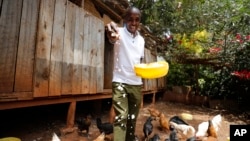African governments are gearing up for what is to come following the 90-day pause on most U.S.-funded foreign aid as they worry about the potential effects.
In Kenya, for instance, Health Cabinet Secretary Deborah Barasa said Wednesday in Nairobi that as her country navigates complex challenges, ensuring continuation of essential health services, especially with programs related to HIV/AIDS and tuberculosis, is essential.
“For more than 40 years, we’ve been able to depend on partners. PEPFAR has done a great job in ensuring that HIV patients, TB patients are receiving health services,” she said, referring to the U.S. President’s Emergency Plan for AIDS Relief, a program that works with partners in 55 countries worldwide.
“With more than 3.7 million being on HIV medication [in Kenya] … I believe it’s critical for us to think of sustainable solutions ... [and] alternative forms of funding,” Barasa said.
While the freeze has been modified to allow waivers for “life-saving humanitarian assistance,” including “core life-saving medicine,” which may apply to health programs such as PEPFAR, many countries are working to assess the implications of what may amount to an end of U.S. foreign aid.
U.S. Secretary of State Marco Rubio said the waiver is clear: "If it saves lives, if it’s emergency lifesaving aid — food, medicine, whatever — they have a waiver. I don’t know how much clearer we can be."
South Africa, with 7.8 million people with HIV, has been one of the biggest beneficiaries of the PEPFAR program the past two decades. Its health minister, Aaron Motsoaledi, told reporters last week in Johannesburg that the country was taken by surprise by the pause in aid and that officials are still trying to decipher the full meaning.
This week, Motsoaledi met with U.S. Embassy officials to discuss bilateral health cooperation and the new U.S. policies on assistance. The two sides promised to keep the communications channels open as they discuss lifesaving health partnerships, according to a joint statement after the meeting.
Asanda Ngoasheng, a South African political analyst, said countries will be affected one way or the other because many public health systems exist only because of the PEPFAR program.
“Even in the case PEPFAR is not funding 100% of the programs, any money that is removed means that countries simply would not be able to afford programs that they were able to afford with the money that was being supplemented by PEPFAR before,” Ngoasheng said.
Programs not related to health are also affected. In Senegal, for example, an infrastructure and development project financed by the Millennium Challenge Corporation, an initiative that was started by Republican U.S. President George W. Bush, could lose funding.
The $550 million power project being implemented by Millennium Challenge Account Senegal was designed to improve the country’s transmission network and increase electricity access in rural areas and to those on the outskirts of cities in the south and central regions.
Mamadou Thior, a journalist and chair of the media watchdog CORED, told VOA: “The financing coming from the U.S. for this second phase will impact about 12 million people.”
Thior referred to a recent speech by Senegalese Prime Minister Ousmane Sonko that emphasized the need for countries to work on being self-sufficient.
"It’s high time for Africans and other people to depend on themselves and not from Western aid because this is what can be the drawbacks,” Thior said.
“They will have to depend on national resources to go ahead with the rest of the [electricity] project because there’s no way to go backwards,” he said.
In Nigeria, a country that received about $1 billion in U.S. foreign aid last year, officials this week launched a committee with members from finance, health and environmental ministries to develop an alternative for some U.S.-funded programs.






